
Emergency Dentist — Sagamore Hills, OH
Quality Dentistry When You Need it Most

Dental emergencies, by their very definition, are sudden, inconvenient, and stressful. Thankfully, should you or a family member find yourselves in the middle of a dental emergency, you can do something about it: call Greenwood Dental.
When you call in with a dental emergency in Sagamore Hills, our team will do everything we can to assist you as quickly as possible. We’ll answer questions, give first-aid tips, and even provide same-day care when necessary. Even if you are unsure whether or not your situation is a dental emergency, just give us a call, and we’ll be happy to advise you on what to do next.
Why Choose Greenwood Dental for Emergency Dental Care?
- Our Team Works to Get You Seen ASAP
- Early Hours and Saturday Appointments Available
- Sedation Dentistry and Advanced Technology In-House
How We Treat Dental Emergencies

- Schedule an appointment quickly and visit our office: As soon as you contact us, a team member will help you get an appointment scheduled, take note of your symptoms, and provide first-aid tips over the phone.
- Get an emergency exam from Dr. Greenwood: We’ll perform an exam and determine if digital X-rays are necessary. Following this step, we’ll have a much better understanding of the source of your emergency and the extent of the problem.
- Getting you relief: We’ll do everything possible to get you out of pain so you can make an informed decision on your future treatment. We’ll explain your cost estimates and timeline so you can set expectations early.
- Receive a personalized treatment plan: Our team will work quickly to get your dental symptoms treated so you can get back to living life without worrying about your smile. Some of the most common services we recommend for dental emergencies include dental fillings, crowns, root canal therapy, extractions, or other treatments.
The Most Common Dental Emergencies
Dental emergencies typically fall into one of two categories: sudden dental injury or infection that occurs over time. At Greenwood Dental, our team is prepared to treat both types of dental emergencies, getting you out of pain and back to smiling. If you’re unsure if you’re experiencing a dental emergency, take a moment to look over the most common ones we treat below.
The 11 Most Common Dental Emergencies
Understanding the Cost of Dental Emergencies
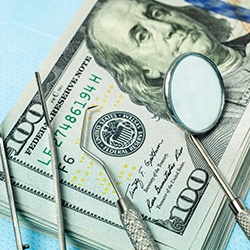
No two emergency visits are the same because no two smiles are the same, and our caring and compassionate team is here to help you navigate the cost of dental emergencies in Sagamore Hills so it doesn’t make your situation even more stressful. We’ll get you seen as soon as possible so you can get out of pain and minimize your worry. We’re also proudly in-network with a number of major dental insurance providers, like Aetna and Guardian Dental Guard Preferred, to name a few, and are happy to help maximize your benefits and minimize out-of-pocket cost.
Every Dental Emergency is Different
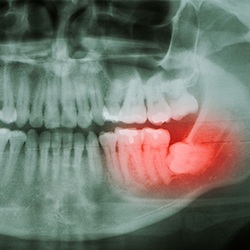
The cost of your dental emergency visit can’t be calculated until our team has had a chance to examine your smile and determine what the problem is and how we can fix it. If necessary, we’ll capture X-rays and Dr. Greenwood will thoroughly examine your teeth and gums. Based on our team’s findings, we’ll create a detailed treatment plan to restore your grin and get you out of pain quickly. Before moving forward with any procedures, we’ll explain our findings to you along with a detailed cost estimate so you know what to expect.
Does Dental Insurance Cover Dental Emergencies?
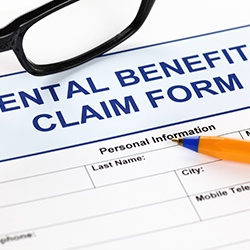
Typically, most dental insurance plans offer some coverage for emergency appointments. For instance, many plans cover the complete cost of at least one emergency examination per year. However, it’s important to keep in mind that every plan is different, and the best way to learn whether yours offers these benefits is to call your provider directly. In addition to emergency exam benefits, many provide 50 to 80% coverage for treatments that are often associated with emergency situations, like root canal therapy and dental crowns.
Options for Making Dental Emergencies Affordable
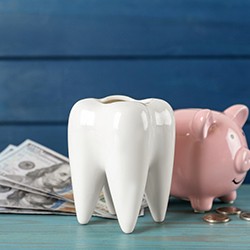
At Greenwood Dental, we’re proudly in-network with many major insurance plans, which means that we offer discounted rates and fees that will help minimize your out-of-pocket cost. Our team is also happy to file insurance claims on your behalf to help you get the most out of your benefits, even if you aren’t in-network with us!
Proactive Dental Care Can Save You Money
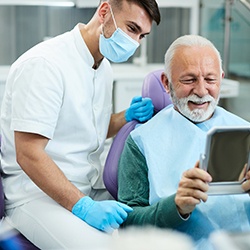
The best way to save yourself from the stress and financial strain of a dental emergency is to be proactive about taking care of your smile! Outside of an accident like a broken tooth due to tripping and falling, routine checkups and cleanings and good at-home oral hygiene can help prevent oral health problems like tooth infections and gum disease from developing, which commonly lead to issues like loose or missing teeth and toothaches. By maximizing your preventive dental benefits and visiting our team every six months, you could save hundreds or even thousands of dollars by avoiding urgent dental care.
Keys to Preventing Dental Emergencies

It goes without saying that it is impossible to predict and avoid every dental emergency – but that doesn’t mean you can’t lower the risk as much as possible! There are plenty of steps you can take to protect your teeth and gums in order to minimize the chances of needing urgent dental treatment. Below, our team has provided some helpful tips for taking care of your smile to stop problems from happening in the first place.
Visit Your Dentist Regularly

Minor dental problems often lead to bigger ones. Fortunately, if you visit your dentist at least once every six months, you’ll have a much better chance of having the small issues caught early. Treating the small issues helps ensure that they won’t eventually turn into severe emergencies.
Remember, routine dental cleanings are your best chance to get tartar off of your teeth before it can lead to cavities. You can get rid of plaque simply by brushing, but tartar is hardened in place and can therefore only be removed by a dental professional.
Maintain Good Oral Hygiene At Home

Of course, even if you visit your dentist twice a year, you still need to make sure that you’re taking good care of your smile at home. Regular brushing and flossing are essential when it comes to preventing oral health issues. Don’t forget that every brushing session should last for two minutes, and it’s best to brush at least two times every day. Make sure that your toothbrush has soft bristles that won’t be too harsh on your enamel.
Stick to a Nutritious Diet

The foods that you eat can have more of an impact on your oral health than you realize. An excess of sugary or starchy foods can make cavities and gum disease more likely to occur. On the other hand, fruits, vegetables, lean proteins, and dairy products can all go a long way toward keeping your smile in excellent shape. Take the time to examine your diet and consider eating more of the foods that are good for your grin while cutting back on foods that can lead to dental problems.
Wear a Mouthguard
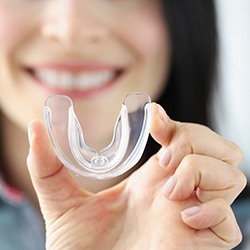
You never know when you might get hit in the mouth when playing your favorite sport. To make sure your teeth stay safe in the event of an accident, always wear a mouthguard before engaging in any sort of athletic activity. Mouthguards are also helpful for people who grind and clench their teeth at night. Keeping the upper and lower rows of teeth separated can go a long way toward preventing damage to the enamel.
Use Tools to Open Packages, Not Your Teeth

The next time you’re struggling to open a package, resist the urge to use your teeth; it could end up leading to chips and cracks in your enamel. It will be much safer for your smile if you simply use scissors or another kind of tool that’s truly suited for the task.
Dental Emergency FAQs

Dental injuries can be stressful to handle, so the last thing you want to do is frantically be searching Google for what to do. For this reason, our team goes above and beyond to help our patients both prevent dental emergencies and learn what to do if they find themselves in the middle of one. To ensure you are as prepared as possible, keep reading to learn the answers to a few of the most frequently asked questions about dental emergencies in Sagamore Hills.
Will my toothache go away on its own?
Sadly, a decayed or damaged tooth won’t be able to heal itself. Furthermore, a once painful toothache that has gone radio silent is likely the result of the infection “killing” the nerve, meaning it’s no longer able to register pain. Since the root of the problem can continue to spread throughout your mouth, it’s of the utmost importance that you visit our dentist in Sagamore Hills as soon as the symptoms arise, like discomfort when chewing. From there, we can diagnose the problem and determine the best course of action for restoring the look and function of your tooth.
What does throbbing tooth pain mean?
Throbbing tooth pain could be the result of several issues, from cracks inside the tooth to teeth grinding or extensive decay. Ultimately, the best way to find out the source of the problem is to schedule an appointment with our dental team, preferably the same day. That way, we can restore your pain-free smile as soon as possible.
My chipped tooth doesn’t hurt. Do I still need to visit?
In short, the answer is yes. Even if a chipped tooth doesn’t hurt, it’s possible for the tooth to break further as you go about your day. So, while this dental injury may not require same-day attention, you should visit our team within a few days of the incident.
Can I fix dentures that are broken in half?
If your dentures have broken in half, do NOT attempt to use a household item, like superglue, to remedy the situation. Adhesives like these may be powerful, but they are full of toxins that are not safe to ingest. Therefore, it’s important to get in touch with the professional who made your dentures right away. From there, they can determine if it can be repaired or if it needs to be replaced.
What should I keep in my emergency dentistry kit?
Having a dental emergency kit nearby will help make treating your tooth-related injury much more seamless. If you don’t have one prepared yet, now’s a great time to change that! Here are a few essential items to include:
- A small storage container (big enough to fit a knocked-out tooth or restoration)
- Sterile gloves
- Gauze pads and dressings
- Cotton balls
- Dental cement (or other temporary filling material)
- Denture adhesive
- Petroleum jelly
- Anti-inflammatories, such as ibuprofen
- Topical anesthetic, such as Orajel
- Floss
- Ice pack
- Contact information for our dental practice (including the phone number, address, and hours of operation)